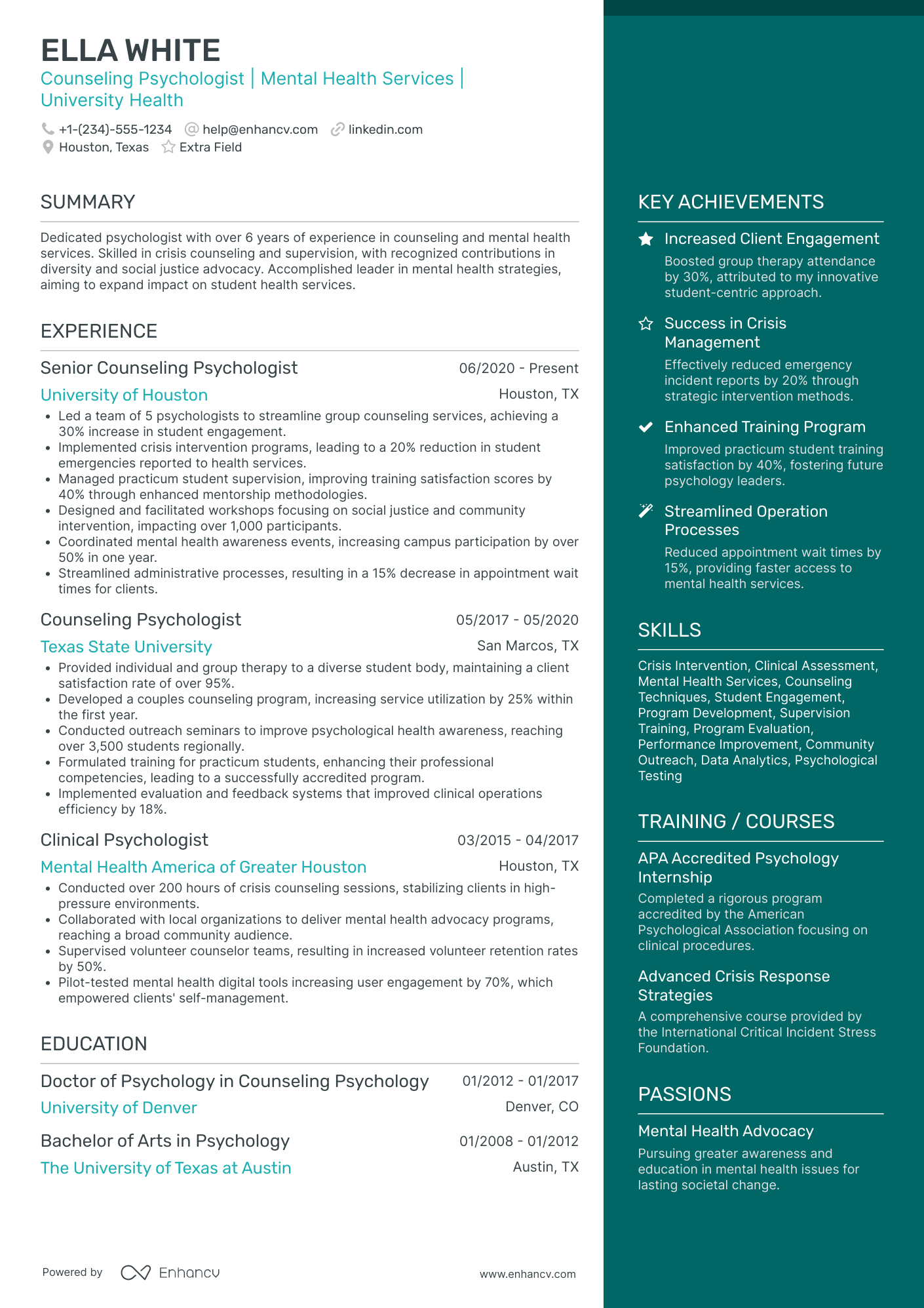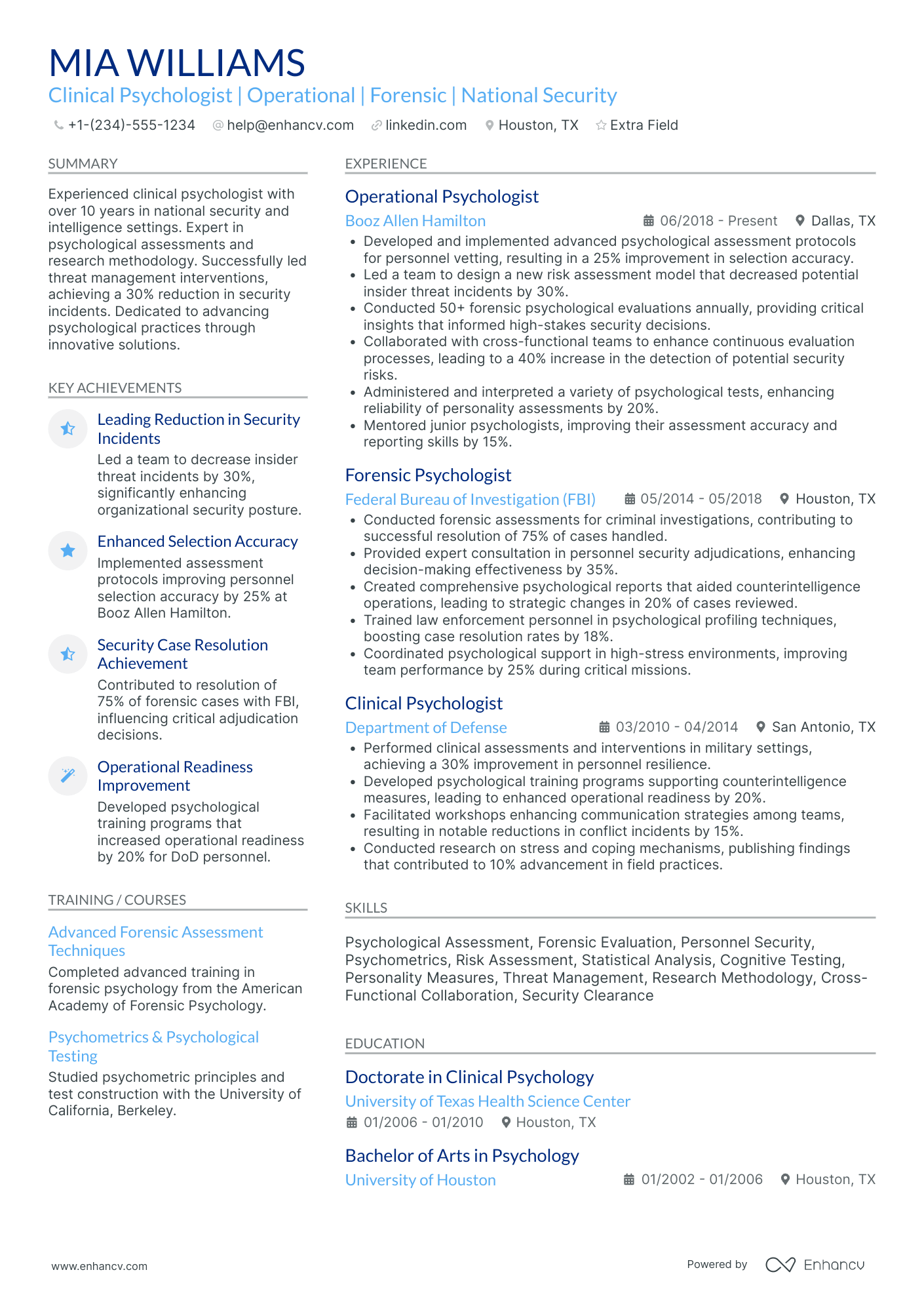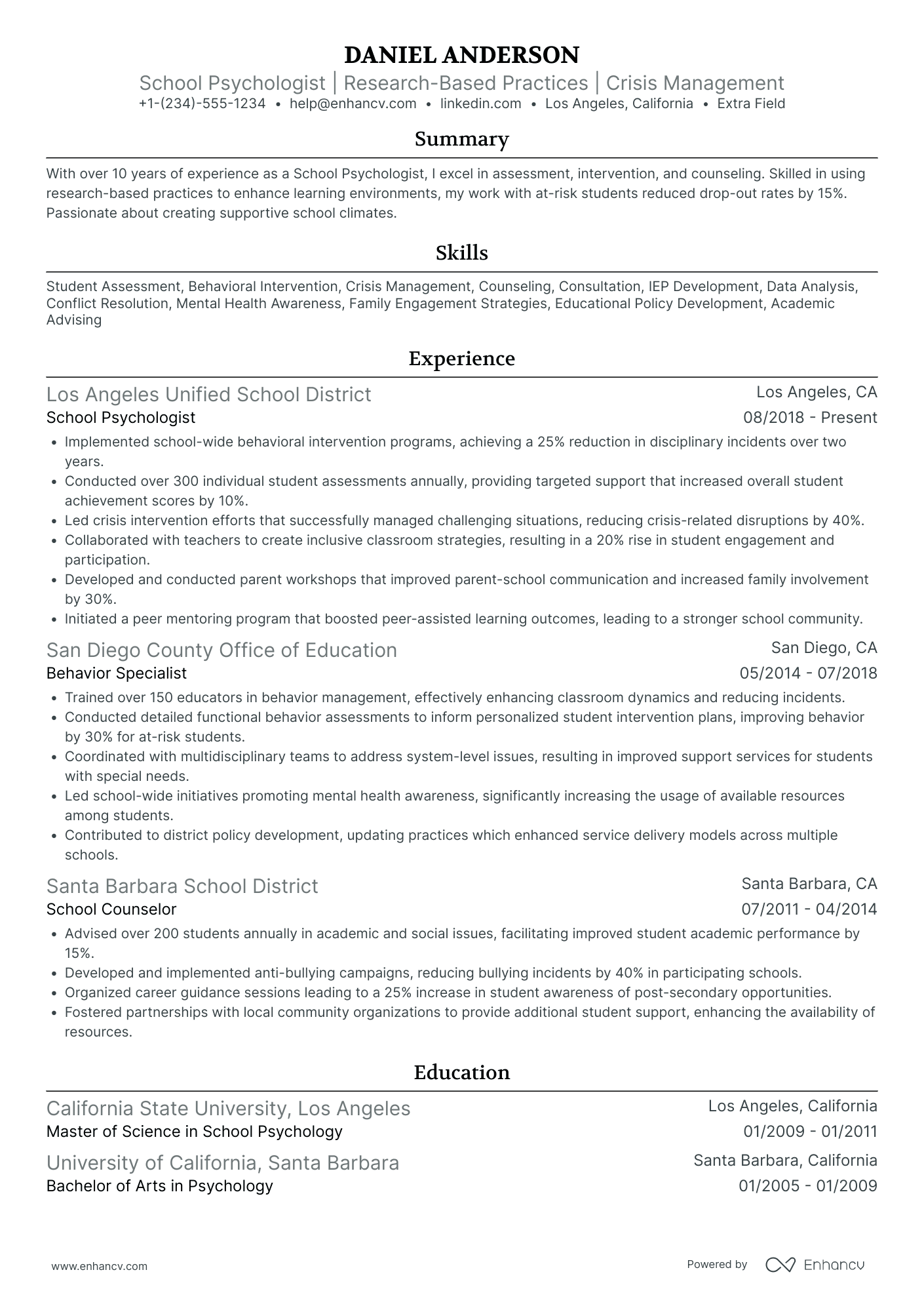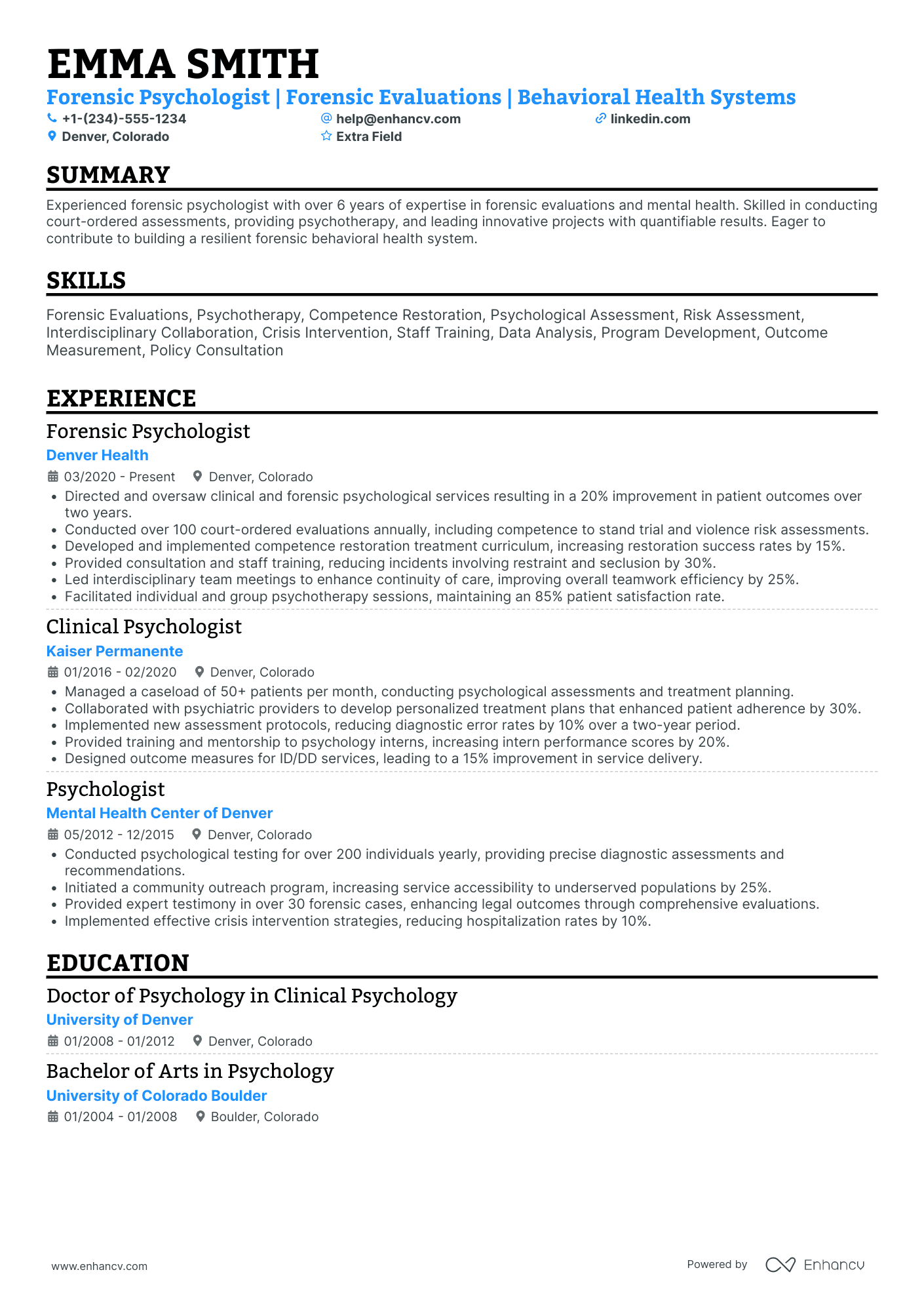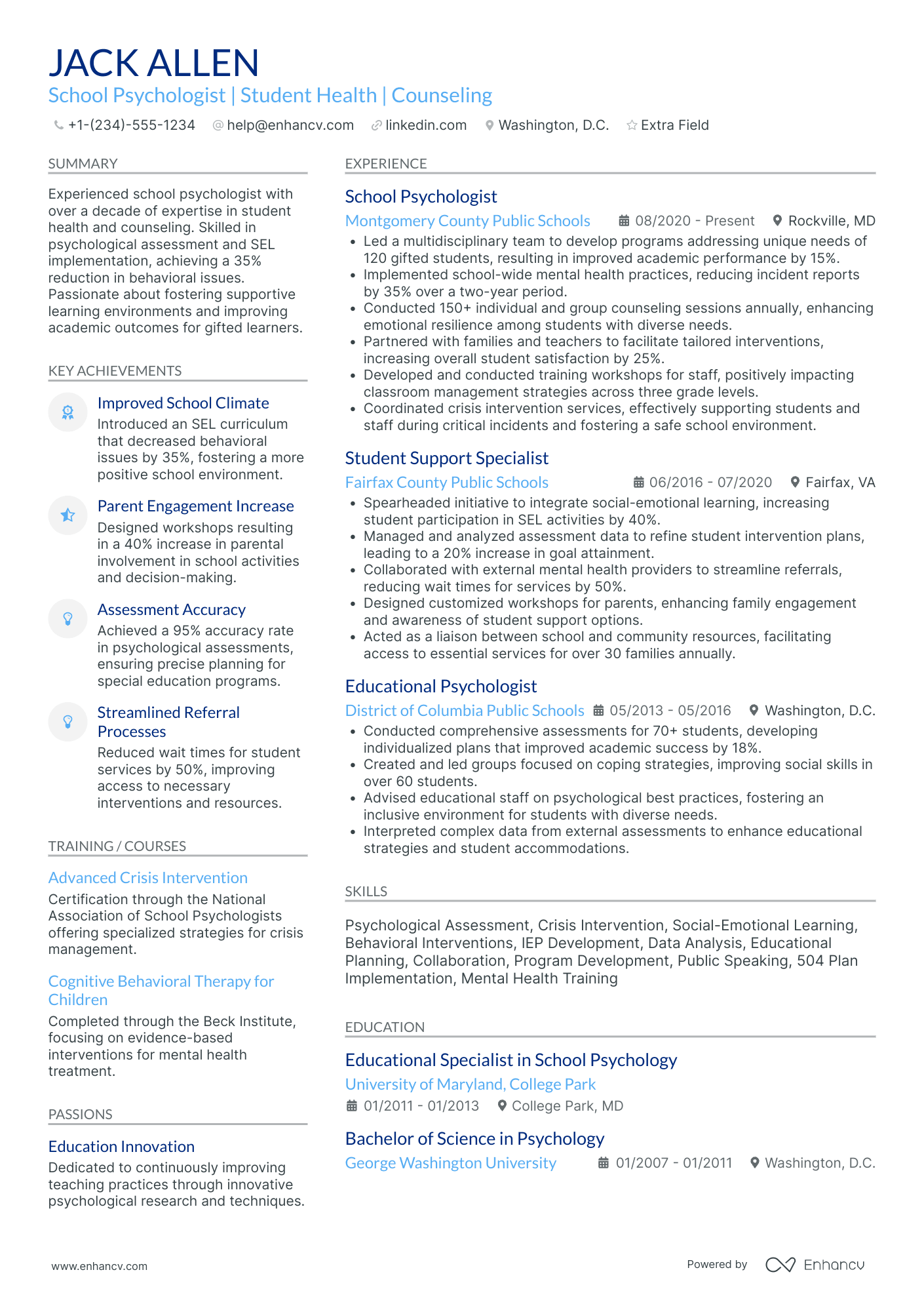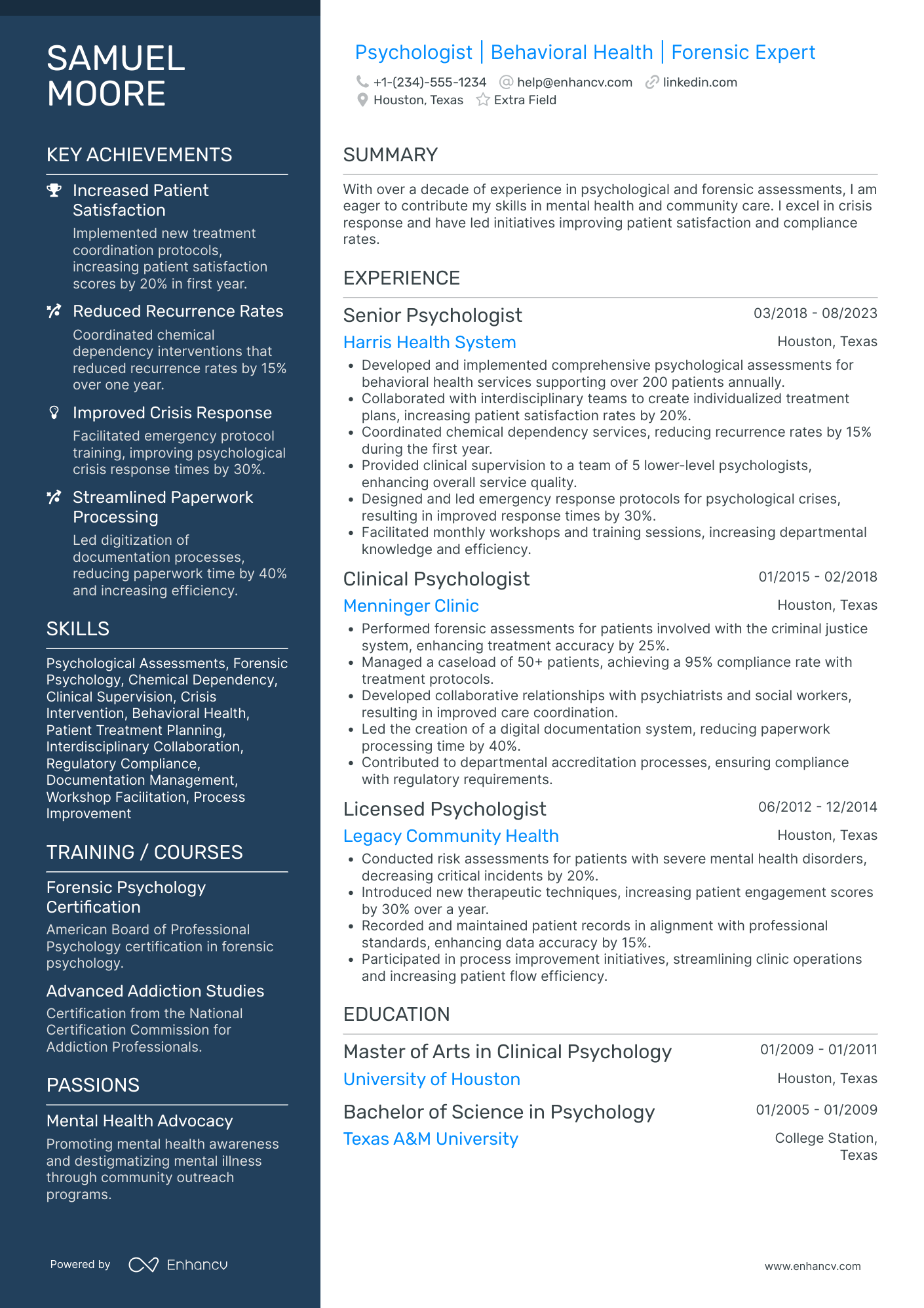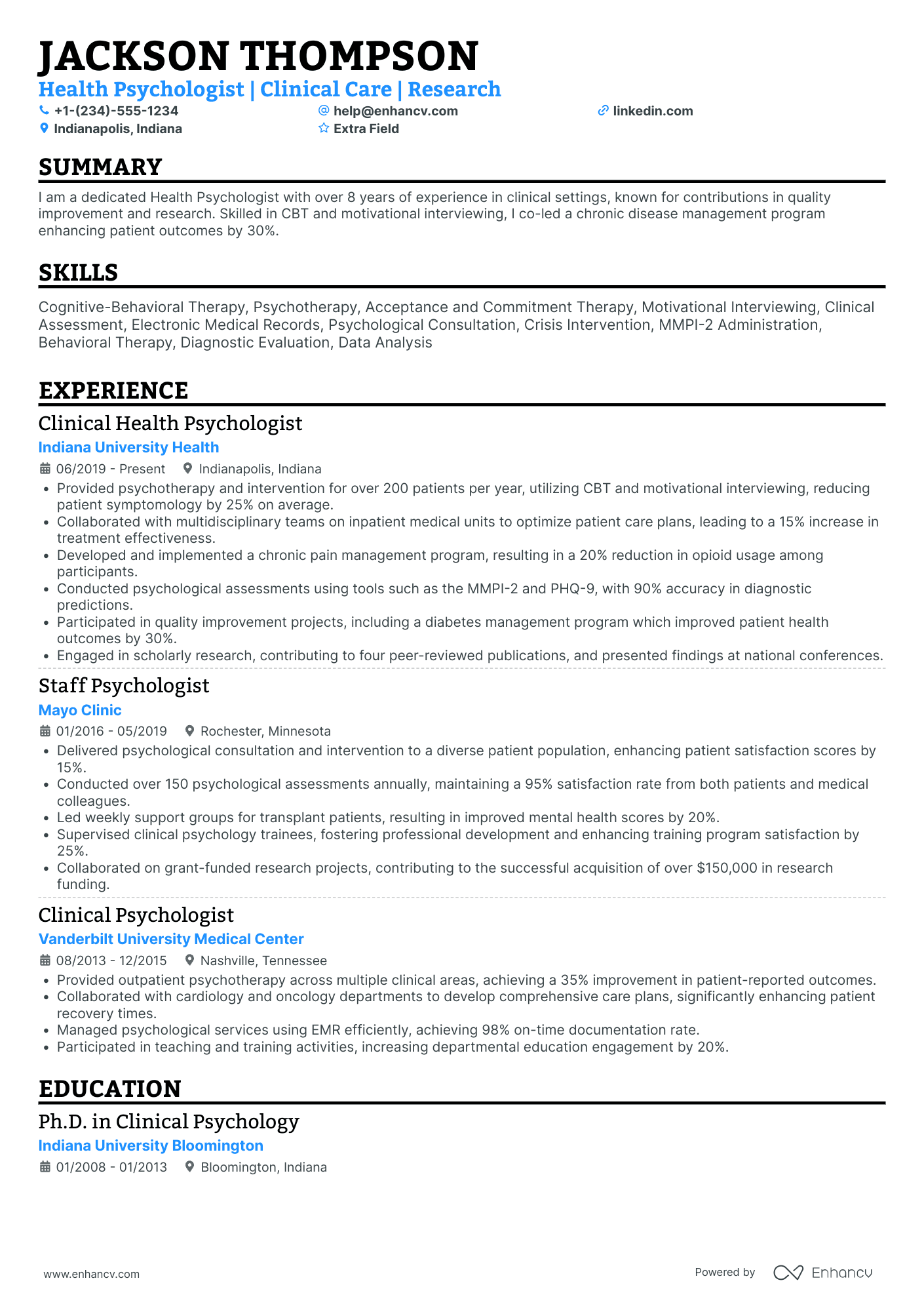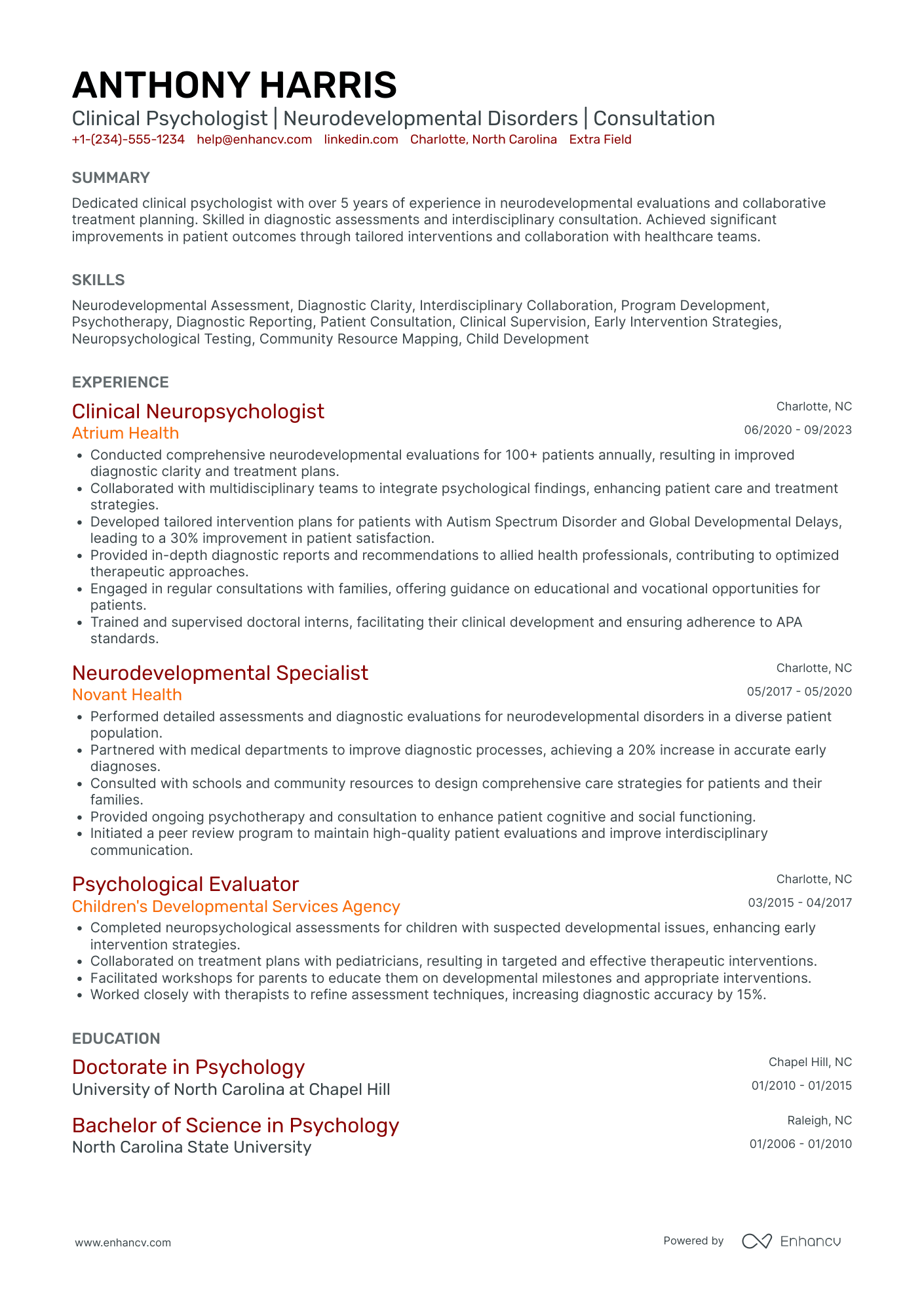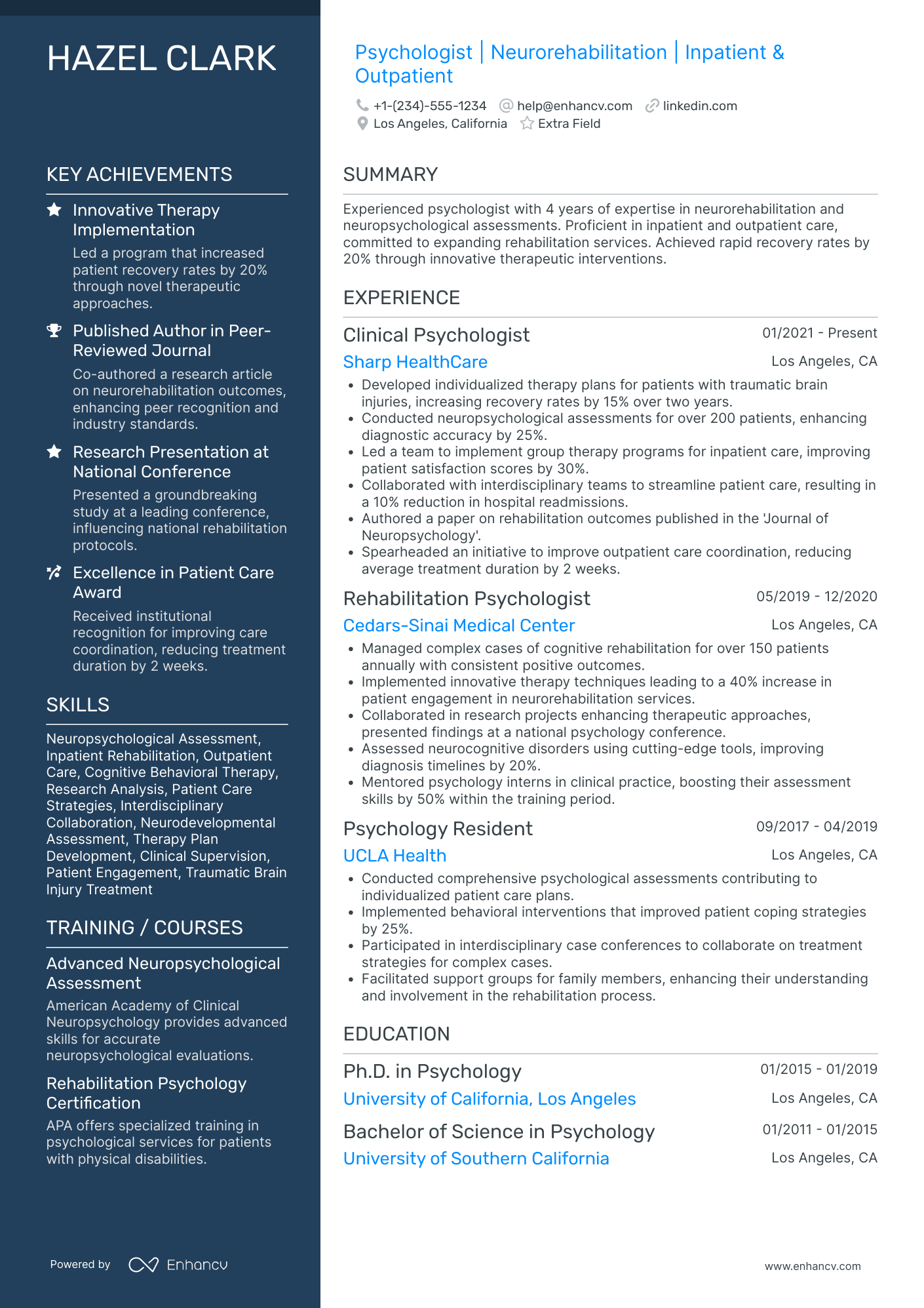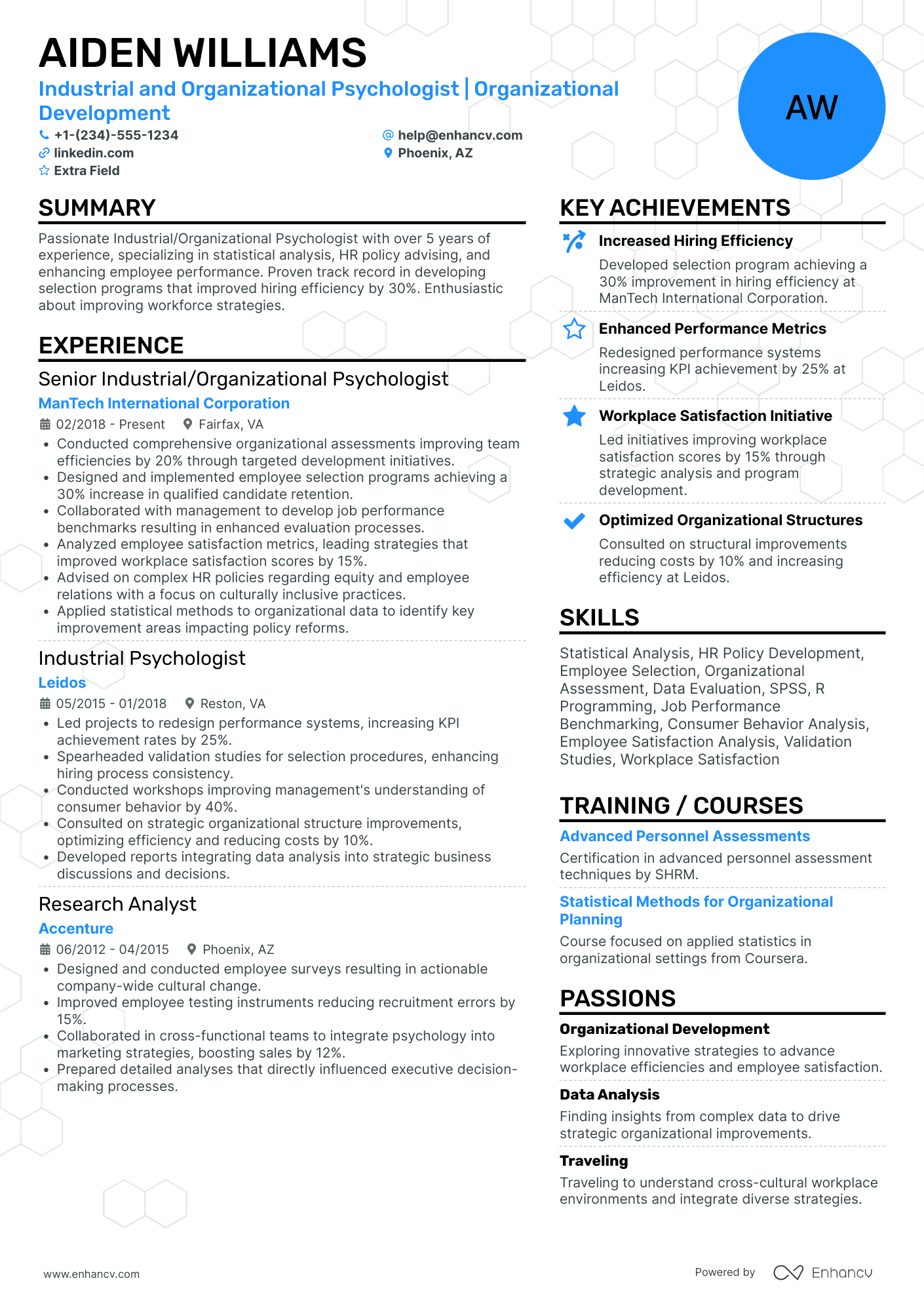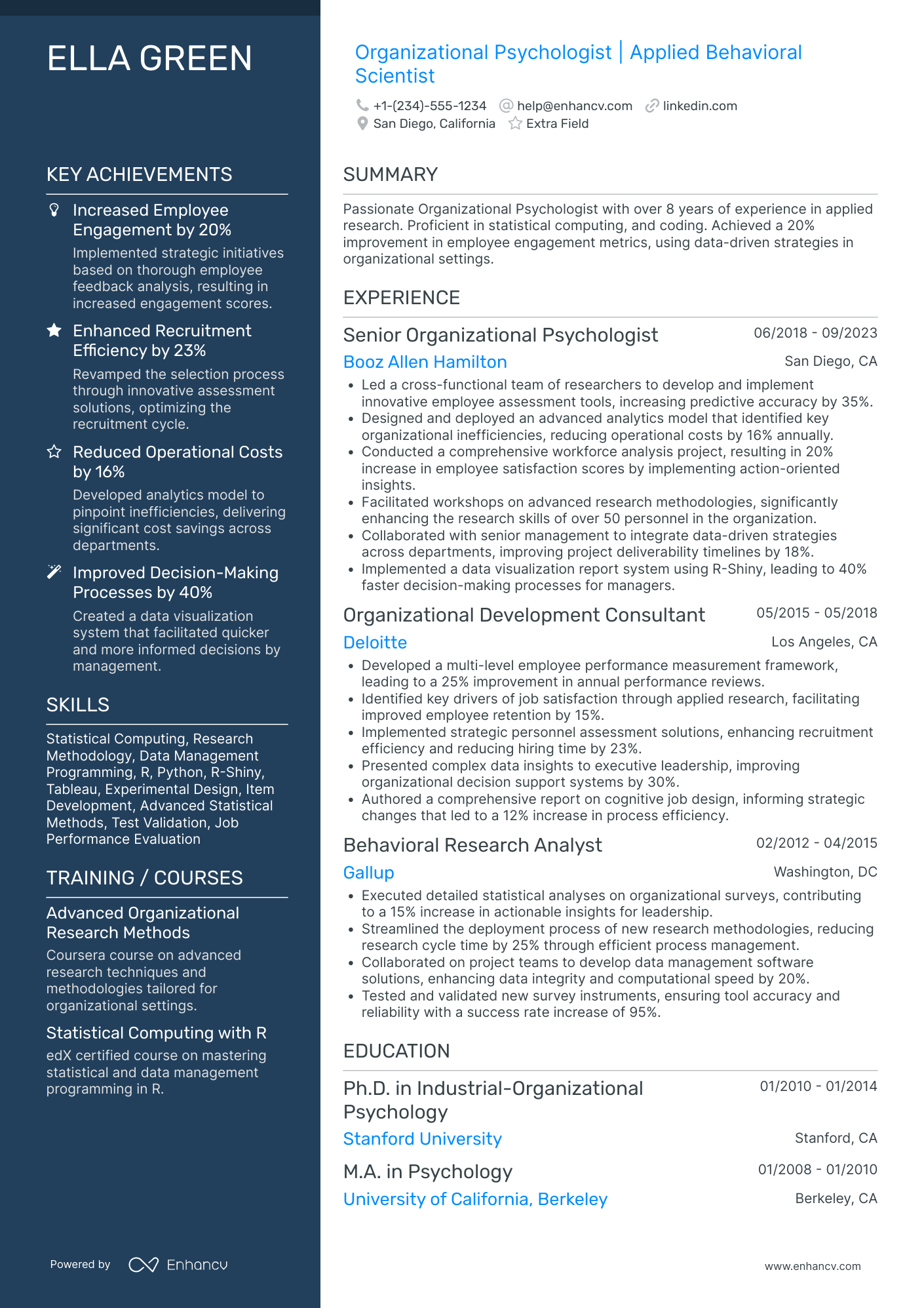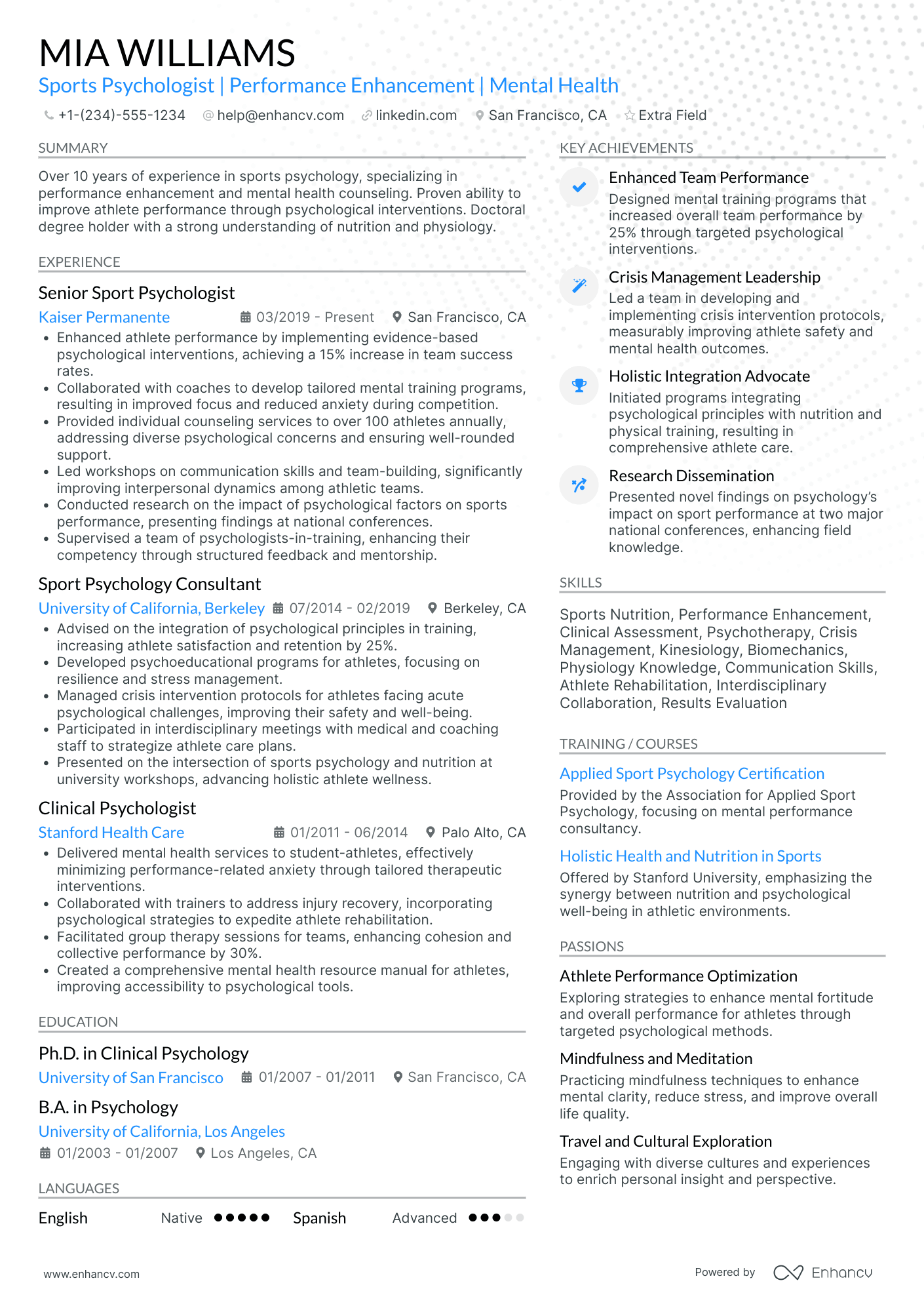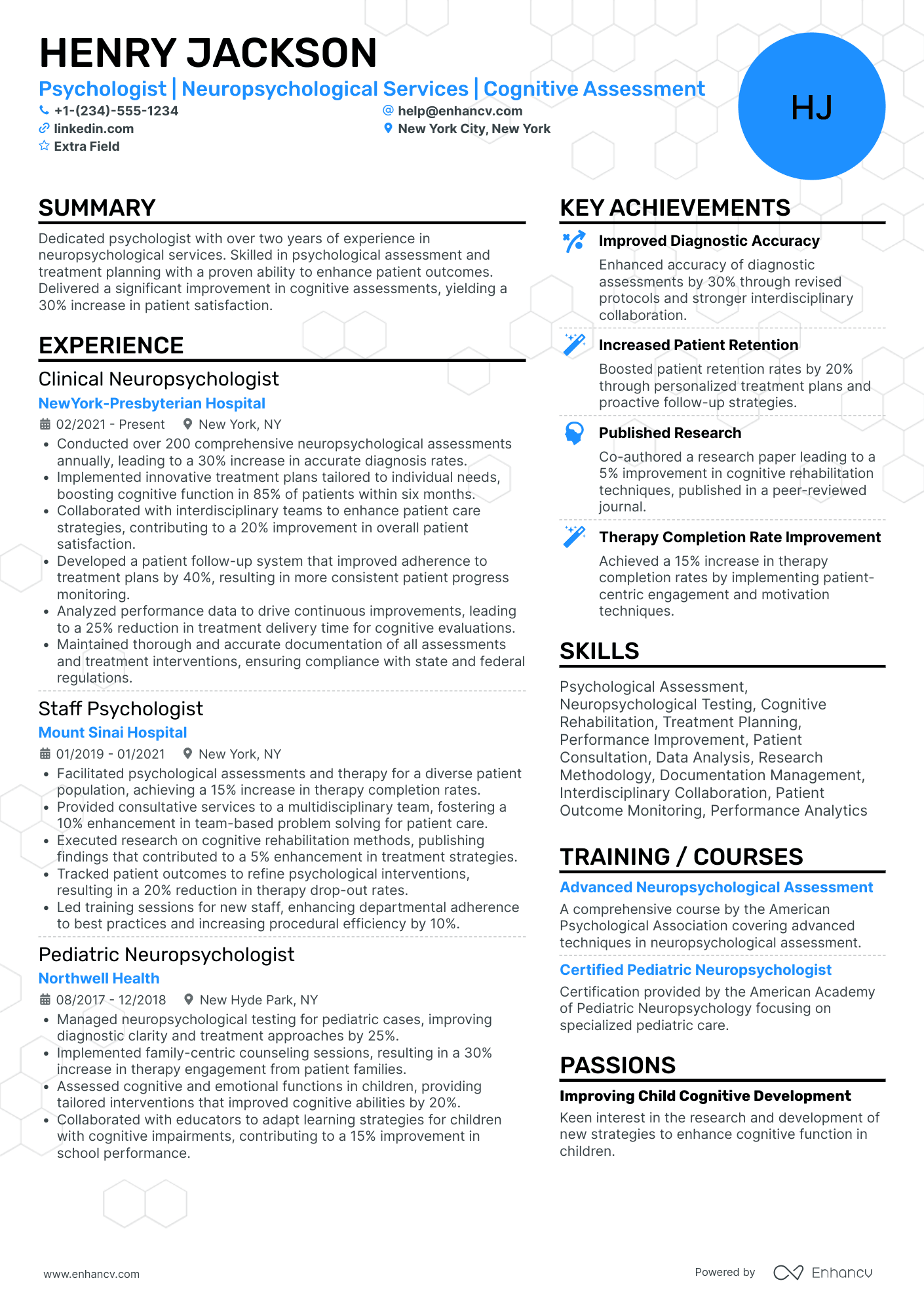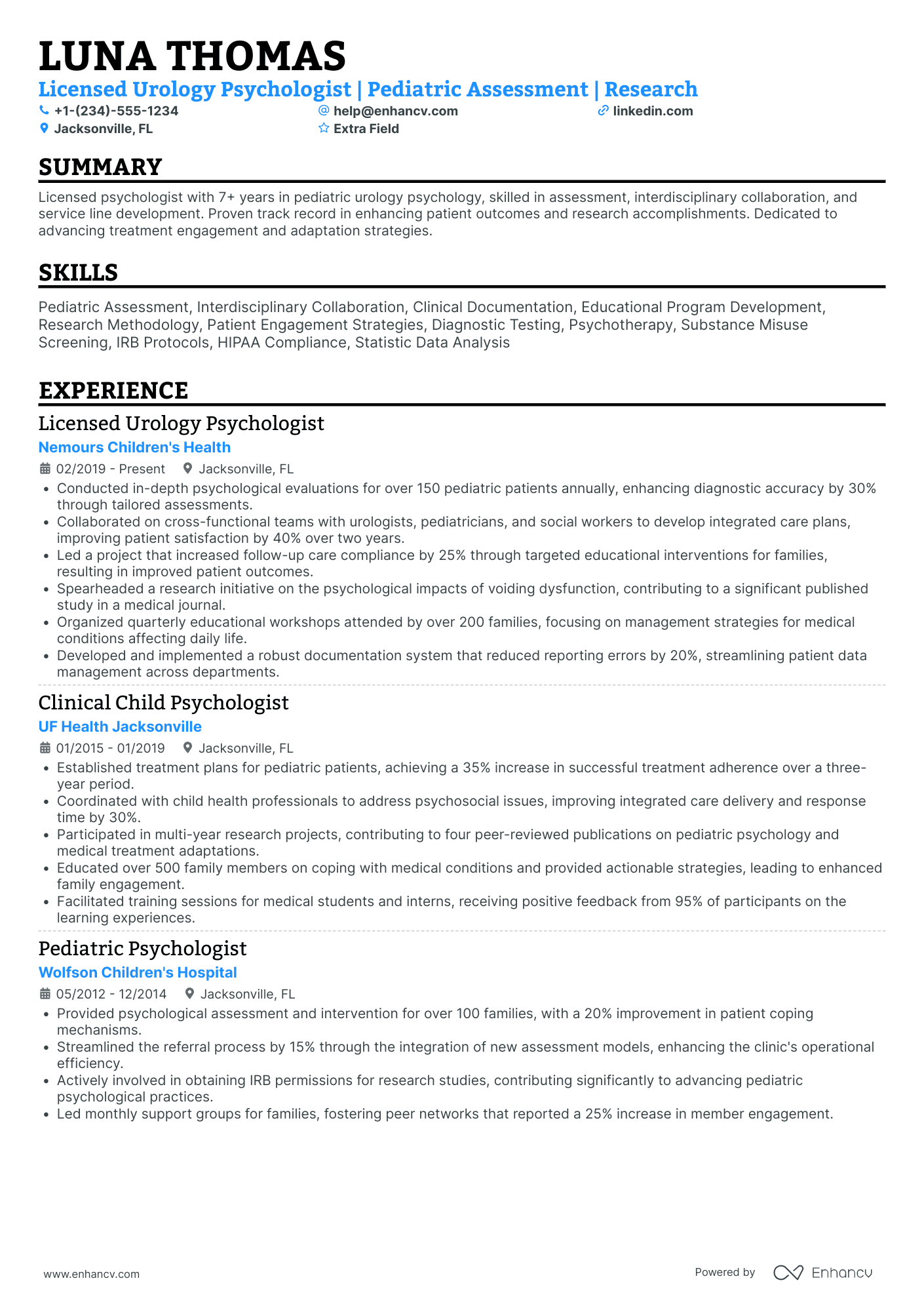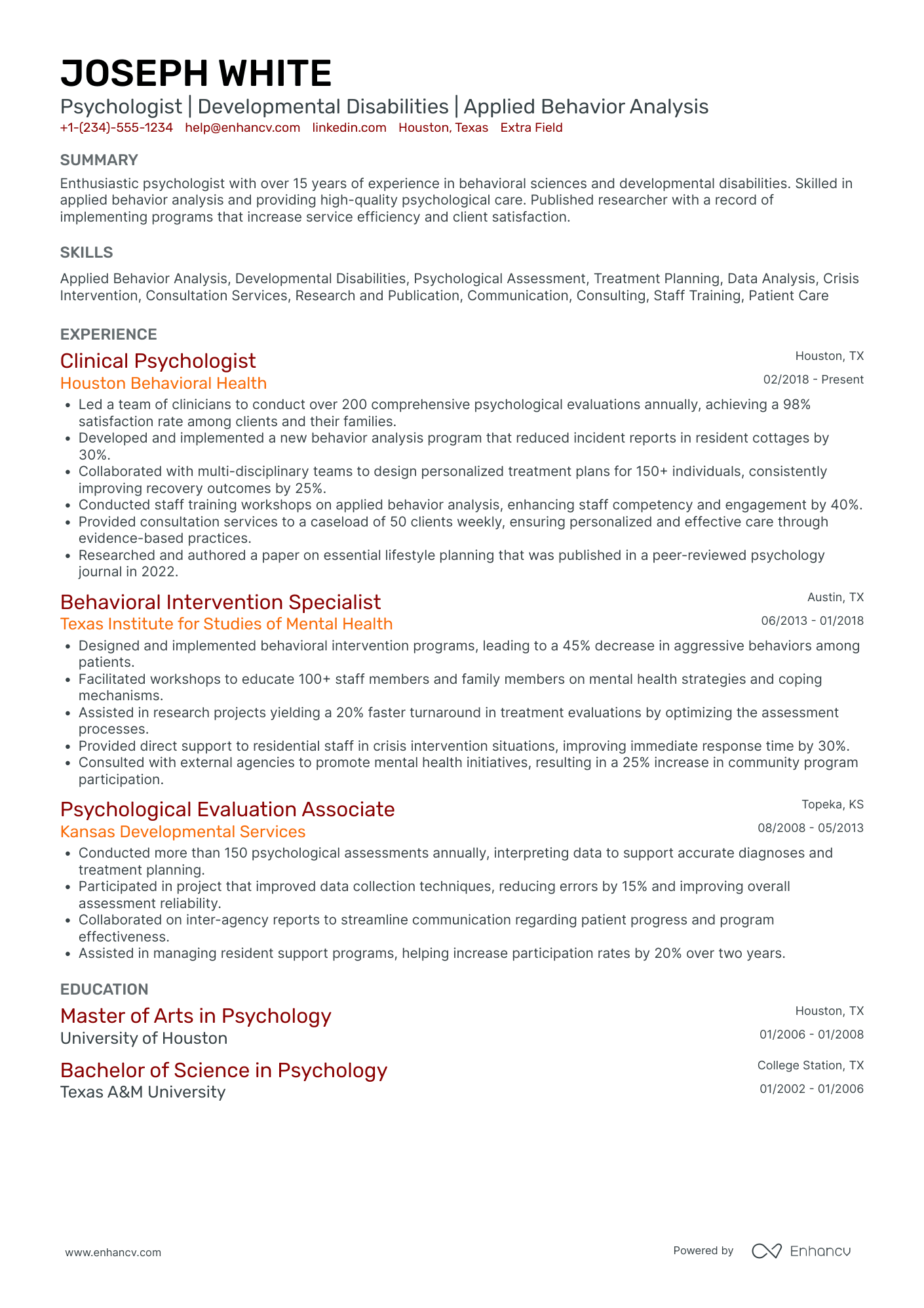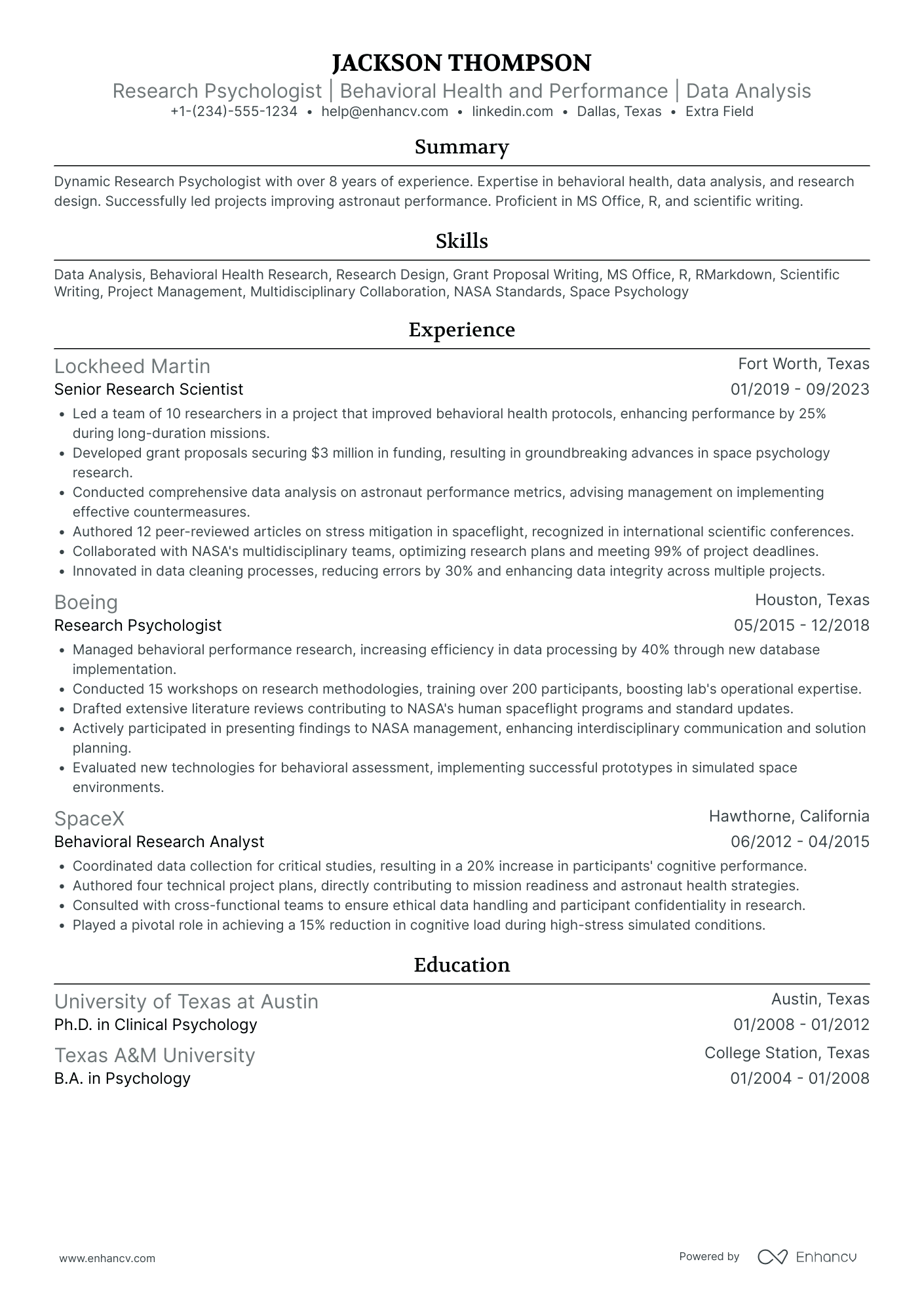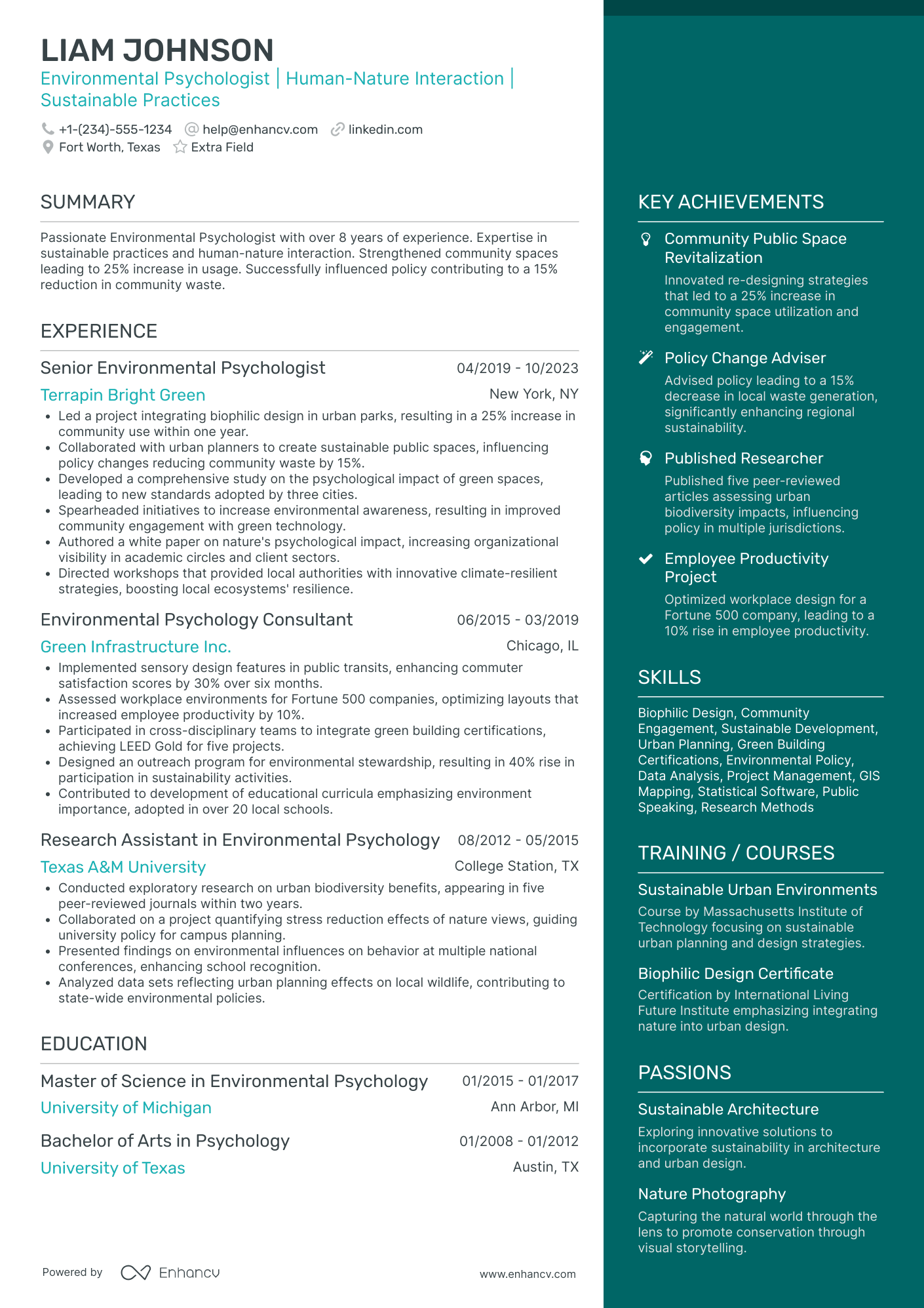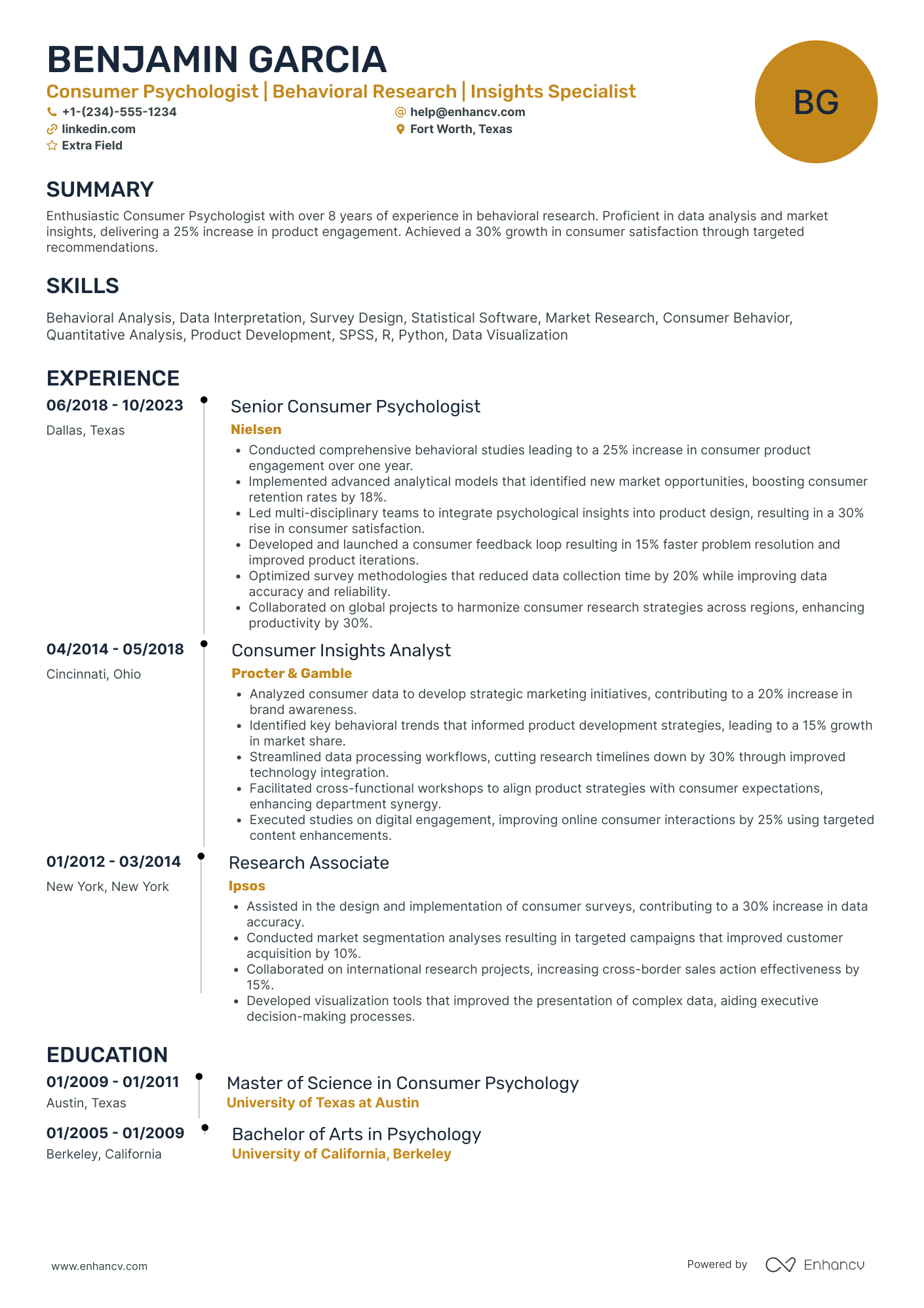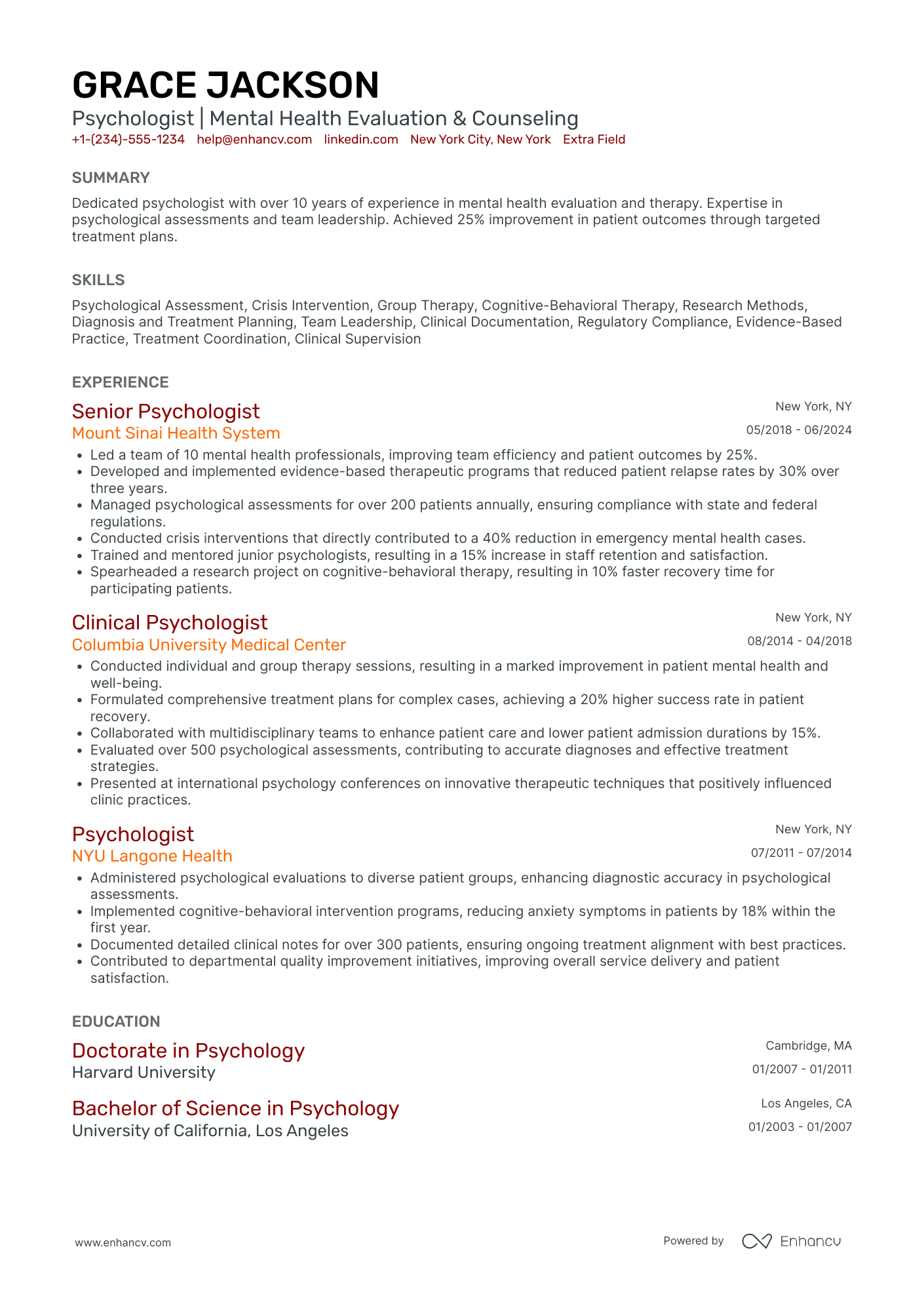There’s a diverse range of career opportunities for graduate psychologists. From private practices through academic environments to corporate settings, psychologists engage in various activities that improve individual and organizational outcomes.
Still, many psychology professionals find it hard to craft a resume that gives justice to their education and experience. After investing countless hours in earning degrees and conducting research, they find it hard to fit all that rich knowledge into their resume.
The U.S. Bureau of Labor Statistics predicts that there will be around 12,000 job openings for psychologists each year. The goal of today’s article is to help you get one of them by building a resume that gives credit to your accomplishments, skills, and research interests.
Here’s what we’ll cover in this psychology resume guide:
- How to format your resume so it looks neat, organized, and skimmable;
- How to tailor the experience section to the job you’re applying for;
- How to showcase your soft skills throughout different sections of your resume;
- How to choose which academic achievements to include and which can be left off;
- What additional sections are worth featuring on a psychologist's resume.
Before we dive in, you might want to consider a few more psychology-related resume examples:
- Clinical social worker resume
- School social worker resume
- School counselor resume
- Occupational therapist resume
- Mental health coach resume
- Psychiatrist resume
How to format a psychologist's resume
Depending on your circumstances, you can choose between three resume format types:
If you have more than 5 years of experience, opt for the reverse-chronological resume. The truth is that recruiters spend around 6 seconds scanning through a resume before making a quick decision. The reverse-chronological layout presents your most recent (and relevant) experience at the top, making the job of the hiring manager easier.
If, on the other hand, your work history isn’t as long or you’re pivoting to a new career path, then the best option is the hybrid resume. This format provides a perfect balance between experience and transferable skills.
For entry-level roles, the functional type is the best choice as it is more focused on skills, rather than experience.
Different markets have specific resume styles – a Canadian resume, for instance, may require a different approach.
PRO TIP
Browse through our traditional resume templates that guarantee you both an optimized structure and superior ATS performance.
There are a few important factors to consider when designing your psychologist resume. You know better than us that after looking at tons of resumes daily recruiters start to expect certain patterns in a resume. Meeting these expectations can help you get noticed because of your accomplishments, not the formatting. Here’s a checklist with the basic formatting instructions:
- Margins: When you have so much to write about, you might be tempted to reduce the size of the margins to squeeze in more information. Still, don’t go with anything less than 1-inch margins as it would make the resume busy, cramped, and difficult to read.
- Fonts: Use professional fonts sized between 10-12 pt. Your goal is to create a resume that can easily pass the initial screening, which is why you should choose a skimmable font. (By the way, all the fonts in the Enhancv resume builder, whether serif or sans serif are 100% ATS-friendly). For the psychology field, a nice serif font like PT Serif and Volkhov perfectly meets industry standards.
- Style: Thoroughly check your resume for spelling and grammar mistakes, extra spaces, or punctuation. After all, the most common writing guidelines we follow are those of the American Psychological Association (APA); so proofreading should be a hygiene factor for you. In case you don’t feel confident in doing so, check out our AI-powered resume checker which can spot errors for you.
- Naming: Following best practices, name your resume by including your name, the title of the position you're applying for, and then add the word “resume” (JaneDoe_Clinicalpsychologist_resume.pdf). Save the file as a PDF to guarantee it can be read on any device or system.
Think of your resume's formatting as the first session with a client—it leaves a lasting impression and sets the stage for everything that follows. A good header plays a key role in that first impression, so here’s how to perfect yours.
How to create a professional header for a psychology resume
Many job seekers consider the header the simplest part of a resume as it contains your name, contact details, and professional website or LinkedIn handle. While those are the things you can’t go without, here are a few more factors to have in mind when writing yours:
- Include your job title: psychologists can specialize in such a large number of areas, that it’s crucial to add your specific title right at the beginning. This will reassure the recruiter you’ve researched the job description and can match your title with what the organization is looking for.
- Use a professional email address: This is as simple as it sounds. If you want to be taken seriously, set up a dedicated email address for your work correspondence.
- Add a springboard link: This is a fantastic opportunity to link to an important piece of research you’ve worked on that will provide recruiters with real evidence of your expertise. Needless to say, whatever you link to should be relevant to the job you’re targeting.
- Insert a photo: This one is debatable, but psychology-related positions are people-facing and your facial features can play a role in the recruitment process. After all, psychologists are trained to read emotions from the face and body language, so we recommend adding a snapshot to your resume.
Finally, design your header to align with the target company's requirements. Even if you’ve chosen a more conservative layout, you can still add a pinch of color to create contrast within the resume sections and draw attention to the most important bits of information.
Is your resume good enough?
Drop your resume here or choose a file. PDF & DOCX only. Max 2MB file size.
Now that we covered the best practices for formatting a psychologist's resume, let us show you what other sections we’ll discuss in detail today.
The top sections on a psychology resume
- The Education and Licenses section explains your academic background and legal qualifications to practice psychology, vital for establishing credibility.
- Clinical Experience showcases your hands-on experience with clients, highlighting your ability to apply theory in practice.
- A Research section details your involvement in psychological studies, demonstrating your analytical skills and contribution to the field.
- Skills and techniques list the therapeutic methods you're proficient in, emphasizing your versatility and effectiveness in treatment.
- The Affiliations section indicates memberships in psychological associations, showing your commitment to staying current in your field.
Crafting these sections correctly should achieve two things. Firstly, they should connect the target job description with your competencies. Secondly, they should demonstrate to recruiters that you understand what is expected of you and that you can deliver.
What recruiters want to see on your resume
- Relevant licenses and certifications demonstrate legal authority and expertise to practice psychology.
- Clinical and counseling experience shows direct experience with clients and the ability to apply psychological theories.
- Specialization areas highlight expertise in specific areas like child psychology or cognitive therapy.
- Research and publications reflecting your contributions to the field and ongoing commitment to professional development.
- Communication skills: Essential for effectively working with clients, colleagues, and within multidisciplinary teams.
Without further ado, let’s break down the most important steps for describing your psychologist's work history.
How to write a psychologist resume experience
The longer your work history is, the harder it will be to pick which parts of your experience to share. So keep in mind that you’re working with a limited amount of space, be it the largest one on a resume.
Do your best to fit everything within a single page. Each entry should have between 3 and 5 bullet points, summarizing your work contributions.
The best way to format the bullet points is to use the C-A-R method which stands for challenge, action, and result. This will help you stay focused on the crucial details and avoid overexplaining yourself. You don’t want to turn your resume into a research paper.
See these two examples of a psychologist’s resume.
- •Over 5000 young adults overcame addiction.
- •Decreased the cases of runaway children.
- •Introduced new CBT treatment methods.
This experience section is thin and unconvincing. To change that, the candidate needs to provide concrete evidence of the success of their work. Check out the improved version below.
- •Empowered over 5,000 young adults to overcome addiction by implementing innovative therapy methods, leading to a remarkable 70% reduction in relapse rates among participants.
- •Implemented a targeted support program that fostered a 40% decrease in cases of runaway children by enhancing family communication and providing crisis intervention strategies.
- •Pioneered the integration of CBT methods, boosting patient recovery rates by 30% and significantly improving mental health outcomes.
Let us give you three reasons why this version works much better:
- Quantifiable achievements: Each entry boasts impressive, measurable results. Quantifying achievements, like the "70% reduction in relapse rates" or a "40% decrease in cases of runaway children," provides clear evidence of effectiveness. These figures help hiring managers grasp the tangible impact of the psychologist's work.
- Demonstration of innovative practices: The mention of "implementing innovative therapy methods" and "pioneering the integration of CBT methods" showcases the psychologist's commitment to staying at the forefront of their field. It highlights their ability to not only adapt to new advancements in psychology but also to apply them successfully.
- Focus on collaboration and communication: The entries emphasize the candidate’s ability to enhance family communication and implement targeted support programs. This underscores their strength in building trust and rapport with clients, an essential skill in the mental health field.
Together, these elements create a compelling narrative of a skilled and innovative psychologist who has made a significant, measurable impact in their field.
Below, we explore how you can quantify your achievements if you’re a psychology professional.
How to quantify impact on a psychology-related resume
Whenever you mention an experience on your resume, ask yourself “So what?” This serves as a reminder that you need to support statements with facts. Here are some examples:
- Include the percentage of clients showing significant improvement on standardized psychological assessments to demonstrate efficacy in treatment methods.
- Mention the number of therapy sessions or programs developed and implemented, showing your capacity for creating comprehensive treatment plans.
- Highlight the reduction rate in client symptoms or issues (e.g., anxiety, depression) post-treatment to emphasize your impact on improving mental health.
- Detail the number of workshops or training sessions conducted to showcase your role in educating others and spreading awareness on mental health issues.
- Quantify the increase in patient satisfaction scores to illustrate your effectiveness in building rapport and trust with clients.
- Report the growth in client base or referral rates, indicating your reputation and effectiveness as a practitioner.
- List the number of publications or research projects contributed to, reflecting your engagement with and contribution to the psychological community.
- Specify the amount of grant money secured for research or community projects, highlighting your ability to support and advance mental health initiatives.
All these can contribute immensely to the effectiveness of any resume —even a junior-level one. Below we discuss how to write a psychologist’s resume with no experience.
How do I write a psychologist resume with no experience
Worry not, there’s a template for this, too. First, use the functional resume layout. It focuses primarily on your skills and educational background. Moreover, it’s great to talk about your supervised sessions or any volunteer work you’ve done in the past.
After you choose a resume format that works for you, it’s time for you to consider information placement. The key here is to strategically transfer any job-relevant skills that you’ve acquired. Use the following as a starting point:
- Educational achievements: Highlight any relevant coursework, certifications, or workshops that have prepared you for this role.
PRO TIP
Adapting your job search to your degree is sometimes necessary. On one hand, you can't claim the title of psychologist without a PhD or PsyD. However, if you aim to practice counseling or psychotherapy, an MA may suffice as the minimum requirement—license included, of course.
- Clinical experience: Highlight any internships or volunteer work in clinical settings. Even observations or shadowing roles can be valuable.
- Research involvement: If you've been involved in research, make it known. Detail your role, the study's aim, and any outcomes or presentations. It may go like this: "Collaborated on a research project examining the impact of mindfulness on stress in college students, culminating in a presentation at the ABC Psychology Conference 2026."
- Soft skills: psychologists need a robust set of interpersonal skills. Don't shy away from showcasing these and include any skills that you deem fitting for the target job.
- Technical skills: Mention any software or tools you're familiar with, especially those relevant to data analysis or teletherapy. Believe it or not, familiarity with telehealth platforms such as Zoom and Doxy.me might turn out to be important additions to your resume.
- Affiliations and community engagement: Being a member of psychology clubs or associations shows your commitment to the field. Any work you've done in the community, particularly if it involves counseling or mental health advocacy, is gold.
Remember, your resume is your chance to tell a story about your budding journey in psychology. Keep it concise, but let your passion and readiness to tackle new challenges shine through.
How to list your hard and soft skills on your resume
The hardest thing about including skills in a resume is knowing how to strike the right balance between hard and soft skills. You’ve been reading this for a while, and you know that you can overcome that by carefully reading the job description and studying the organization you’re applying to. Everything you need to put in your resume is already there.
You might find pinpointing your hard skills easier. These are the ones you acquire through education, training courses, and on-the-field experience. Plus, you can prove them because they’re measured by your performance.
Here’s a list of the most common technical skills to feature in your resume:
Best hard skills for your psychology resume
- Psychological assessment and evaluation
- Cognitive-behavioral therapy (CBT)
- Neuropsychological testing
- Statistical analysis software (e.g., SPSS, SAS)
- Research methodology
- Psychometric testing
- Data analysis and interpretation
- Clinical psychology
- Child and adolescent psychology
- Psychotherapy techniques
- Behavioral analysis
- Mental health diagnostics
- Therapy session recording technologies
- Electronic health records (EHR) systems
- Biofeedback technology
- Applied behavior analysis (ABA)
- Developmental psychology
- Forensic psychology
- Psychopharmacology
- Multicultural counseling techniques
While most psychology-related jobs are technically demanding, they also require an array of soft skills. A big part of these fall into the transferable skills category. Especially if you have experience working with vulnerable individuals, minority groups, and people with special needs.
Best soft skills for your psychologist resume
- Empathy
- Communication skills
- Active listening
- Patience
- Critical thinking
- Problem-solving
- Adaptability
- Interpersonal skills
- Conflict resolution
- Cultural competency
- Stress management
- Team collaboration
- Ethical judgment
- Resilience
- Motivational skills
- Time management
- Emotional intelligence
- Persuasion
- Negotiation
Hiring managers don't expect a complete listing of your interpersonal skills in a dedicated section. Instead, you can subtly incorporate them across various parts of the resume, ensuring they are implied rather than explicitly stated. Nonetheless, it's crucial to provide evidence of these qualities. Consider how you'd respond to skills-related questions during a job interview, then distill those descriptions into the most succinct form for your resume.
How to write about certifications and education in a psychologist's resume
Often, the education section on your resume can catch recruiters' eyes first, especially if you've graduated in the past few years. In such cases, placing education before work experience is a smart move.
As noted, the academic credentials of psychologists are closely examined. A clinical psychologist, for instance, requires a doctoral degree and clinical experience for licensure. It's crucial to highlight every academic degree you hold to bolster your relevance for the position you're eyeing.
Then, structure this section with the what-where method:
- Declare your degree and the field of study.
- Mention the institution and its location.
- Detail the duration of your studies.
- Optionally, include courses that may interest your prospective employer.
Your education section may look like this:
- •Dissertation research centered on effective interventions for patients with co-morbid psychological and chronic physical health conditions.
When it comes to certifications and licenses, they are obligatory for any psychology practitioner and, thus should be prominently listed on your resume. No matter what career path you choose, be it one requiring a Ph.D. or just a bachelor's degree, recruiters still find certifications important. Here’s a small list of the top psychology certifications:
Highly valued certifications for your psychologist resume
Last but not least, the licensing regulations in the US are very strict as you can’t start independent practice without a license. You must highlight yours on your resume. Not only does it serve as a stamp of approval, but it also opens the doors for better job opportunities.
Wondering where the best place to mention your license is? Your resume summary is the perfect section to do that. Read further to know how to craft yours.
How to write your psychologist resume summary or objective
There are two ways to approach statement writing: you can go with a career objective or a summary. The difference between them is that the objective statement is shorter, no more than 3 sentences, and is recommended for candidates with less experience. The resume summary is up to 5 sentences long and showcases your skills, experience, and accomplishments.
Since psychology training can take no less than 5-7 years to complete, we advise you to write a career summary. To illustrate how it’s done, let us show you two examples, a bad and a good one.
The summary looks like a telegram due to its terse and rushed phrasing. Describing oneself as a board-certified clinical psychologist working with the police could be seen as arrogant. Moreover, the text is vague and lacks the context needed to be impactful.
There are no references to specific projects and employers, which leaves the listed personal qualities unverified.
What’s worse, this is where you make sure you feature your greatest achievements. This candidate has missed their chance.
How do you prevent that? Take a look:
Below we break down why this version is more effective.
- Experience speaks volumes: A decade in the field with family therapy and adolescent issues? This shows depth, commitment, and the ability to handle high-risk patients.
- Expertise: Anxiety, depression, OCD, substance abuse, and eating disorders—this isn't just a niche; it's a whole suite of them. This psychologist makes sure that their specialty is prominently featured.
- Real-world impact: Educating over 15,000 young adults with the D.A.R.E. program shows action, not just words. Note that even in the summary, there’s an opportunity to provide metrics for one’s success.
- Credibility: Being part of the West Virginia Psychological Association and serving as a Transition Specialist is a fact that says a lot in the psychology world.
- Scholarly contributions: The candidate’s contribution to the Psychological Science Journal means they're not just in the field; they're helping to move it forward.
When creating a psychologist's summary, pay careful attention to the wording. First, highlight the keywords mentioned in the job posting. Next, summarize your career by emphasizing the key moments. Try to build a powerful picture of your skills and experience, so that hiring managers can form a positive impression of your character. Of course, remain authentic. There's no reason to lie or hide details, as these will become apparent if you are called in for an interview.
Optimize your resume summary and objective for ATS
Drop your resume here or choose a file.
PDF & DOCX only. Max 2MB file size.
Additional sections for a psychologist resume
The additional sections will be determined by what the job description demands. If you’re going for a clinical or a research job, some of these would certainly get you noticed:
- Research papers and publications
- Association memberships
- State psychological associations
- Presentations and conferences
- Extra certifications and prizes
- Awards and honors
Yet, if you’re more interested in community management roles, the following are better:
How to list membership in professional organizations
After listing your licenses and certifications, professional affiliations are probably one of the most important additional sections on a psychological resume. Memberships in organizations such as the APA or specific to a subfield or specialty demonstrate ongoing engagement with the professional community and a commitment to staying current in the field.
To feature your affiliations, include the name of the organization and the dates of your membership. If you’re a board member or committee chair, make sure you list those roles along with the association name.
Key takeaways
With this guide, we showed how to craft a psychologist resume that stands out with impeccable formatting and carefully selected details about your extensive experience. These are the main points we covered:
- How to design a resume that is informative, organized, and easy to read by both human and AI assessment.
- How to do justice to your training and work experience with quantified results.
- What skills to feature on your resume and which ones should be implied without being specifically listed.
- What resume sections are obligatory in the field of psychology, i.e., Licenses, Certifications, and Education.
- How to adapt your resume to the job listing you're considering applying for.
Psychologist resume examples
By Role
